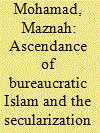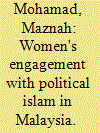| Srl | Item |
| 1 |
ID:
098379


|
|
|
|
|
| Publication |
2010.
|
| Summary/Abstract |
Malaysia's trend of mounting religiosity should not be seen as merely stemming from political rivalry between its two biggest Muslim parties (UMNO and PAS) but also from another source, its Sharia-aspiring bureaucracy. The hegemony of this religious bureaucracy is based on its power as arbiter of the "right" or official Islam and its oversight over Sharia laws and Islamic public institutions. Insulated from voters' displeasure and, to a large extent through its strategy of invoking the immutability of Sharia, this bureaucracy has emerged as the lynchpin of Malaysia's state-driven Islamization. But even as Sharia proponents disavow secularism, the essence of Islamic legal and bureaucratic transformation is closer to a secularized adaptation than to a process of desecularization. Furthermore, as much as the bureaucracy is seemingly unstoppable, it is far from being fully stabilized as it confronts a dissenting section of the Muslim middle class who are also keen to capture the discursive, but highly fortified legal space of "authentic" Islam occupied by this bureaucracy. Ultimately, what surfaces in Islam's politicization is the contestation between a secularized Sharia bureaucracy and its juridical subjects, rather than a desecularization movement.
|
|
|
|
|
|
|
|
|
|
|
|
|
|
|
|
| 2 |
ID:
084977


|
|
|
|
|
| Publication |
2008.
|
| Summary/Abstract |
In this article I discuss Malaysia's turning point moments - the March 8th General Election and the August 26th by-election which respectively saw the opposition's ascendancy and Anwar Ibrahim's political comeback. The opposition's ability to gain an 'optimum multiethnic consensus' had denied the incumbent of its unbroken two-thirds majority win. Its coalition arrangement was presented as a credible alternative to the 51 year-old winning but increasingly fractured coalition of the incumbent. In the final analysis a combination of a dwindling economy, the Abdullah-versus-Anwar leadership factor and the new media was what provided the major push for the swing. The article ends by posing various questions about the future of Malaysia's characteristic ethnic vote, the possibility of an emerging two-party system and of a probable Malaysia under Anwar Ibrahim.
|
|
|
|
|
|
|
|
|
|
|
|
|
|
|
|
| 3 |
ID:
052490


|
|
|
|
|
| Publication |
June 2004.
|
| Summary/Abstract |
This essay delves into the engagement of Muslim women's groups with political Islam in Malaysia. It argues that a political Islam that has been seen to be broadly inimical to women's status and interest has been ameliorated by such an engagement. Furthermore, the plurality of Islamic engagement by women, ranging from pragmatists, communitarians to liberal-feminists, has arguably led to a less than hegemonic Islamic order in Malaysia. Such engagement by Muslim women has concomitantly also contributed to a blunting of Malay-Muslim dominance by exploding the myth of Malay consensus in the multiethnic political system.
|
|
|
|
|
|
|
|
|
|
|
|
|
|
|
|